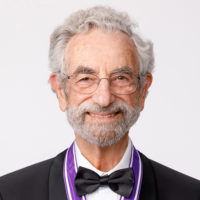
Elliott H. Lieb
2023 Kyoto Prize Laureates
Mathematical Sciences(including Pure Mathematics)
/ Mathematician and Physicist
1932 -
Professor Emeritus, Princeton University
My Journey Through Physics and Mathematics
2023
11 /11 Sat
13:00 - 16:00
Place:Kyoto International Conference Center
Capacity:1,500 persons (FCFS)
Admission Free
Elliott H. Lieb, primarily through his achievements in many-body physics, established a foundation for mathematical research in fields such as physics, chemistry, and quantum information science. His contributions to the development of mathematical analysis are significant as well. He is one of intellectual giants in the field of mathematical sciences.
Elliott H. Lieb, primarily through his achievements in many-body physics, established a foundation for mathematical research in fields such as physics, chemistry, and quantum information science. He also made significant contributions to the development of mathematical analysis. Few researchers have made such broad and fundamental contributions to modern mathematical sciences.
Quantum mechanics gives us a theoretical understanding of various phenomena in the world. Lieb’s research focused on the mathematically rigorous analysis of quantum many-body systems, which are systems composed of numerous elements governed by quantum mechanics. These systems exhibit a wide array of behavior and provide a fertile ground for mathematical research.
The matter surrounding us consists of innumerable atomic nuclei and electrons. The fact that these microscopic particles do not attract each other and “collapse” but to form a stable substance is not self-evident, and can only be understood through many-body quantum mechanics. Lieb devoted years to researching the stability of matter, yielding a deep and rich history (1). This research led to an analytical result known as the Lieb-Thirring inequality (2). Moreover, Lieb proved and refined many inequalities (3, 4, 5) in analysis, garnering high regard in the field of pure mathematics.
His research on quantum many-body systems boasts numerous achievements, including the mathematical foundation of the density functional theory (6), which is crucial in quantum chemical calculations; the elucidation of magnetic interaction origins; proof of various fundamental results in quantum spin systems and the establishment of analytic methods; the proposal of the AKLT spin model, which provided a template for “topological phases of quantum matter”; and the analysis of many-body Bose systems’ ground states.
His research results in quantum systems are closely linked to quantum information theory, which underpins next-generation technologies such as quantum computers and quantum cryptography. Among these, his proof of the strong subadditivity of quantum entropy (7), initially a product of pure mathematical interest, has since become the foundation of quantum information theory and is now a staple in textbooks within this field.
Lieb’s contributions were also vital in the field of statistical mechanics, which explores phase transitions and thermodynamic properties of matter. Exact solutions of two-dimensional ice models (8) became early examples of solvable models in statistical mechanics and set the standard for theoretical studies of matter with residual entropy. Remarkably, these results also influenced the theory of low-dimensional manifolds in pure mathematics.
For these reasons, the Inamori Foundation is pleased to present the 2023 Kyoto Prize in Basic Sciences to Elliott H. Lieb.
References
(1) Lieb EH et al. (2005) The Mathematics of the Bose Gas and its Condensation (Oberwolfach Seminars series, 34) Birkhäuser.
(2) Lieb EH & Thirring WE (1975) Bound for the Kinetic Energy of Fermions Which Proves the Stability of Matter, Phys. Rev. Lett. 35: 687–689. Errata 35: 1116 (1975).
(3) Lieb EH (1983) Sharp constants in the Hardy-Littlewood-Sobolev and related inequalities, Annals of Math. 118: 349–374.
(4) Brascamp HJ, Lieb EH & Luttinger JM (1974) A general rearrangement inequality for multiple integrals, J. Funct. Anal. 17: 227–237.
(5) Brascamp HJ & Lieb EH (1976) Best constants in Young’s inequality, its converse, and its generalization to more than three functions, Adv. in Math. 20: 151–173.
(6) Lieb EH & Oxford S (1981) Improved lower bound on the indirect Coulomb energy, Int. J. Quant. Chem. 19: 427–439.
(7) Lieb EH & Ruskai MB (1973) A Fundamental Property of Quantum-Mechanical Entropy, Phys. Rev. Lett. 30: 434–436.
(8) Lieb EH (1967) Residual Entropy of Square Ice, Phys. Rev. 162: 162–172.
Profile is at the time of the award.